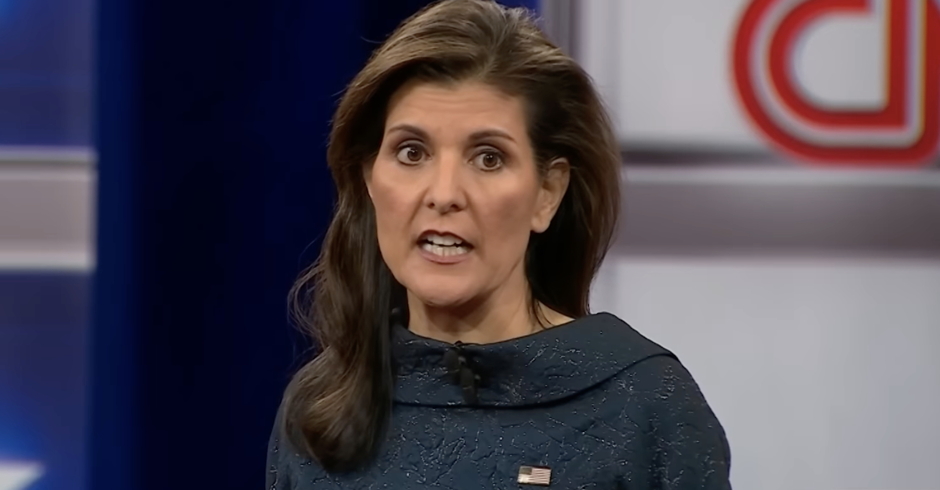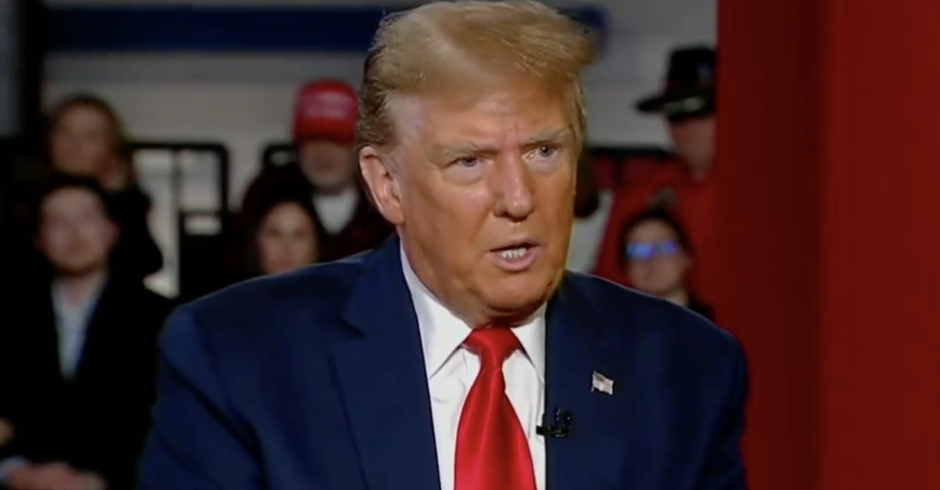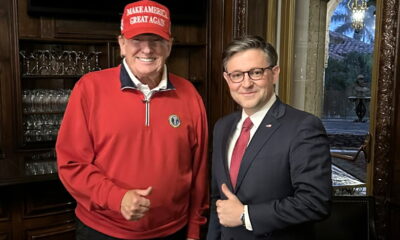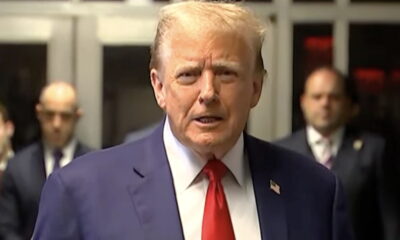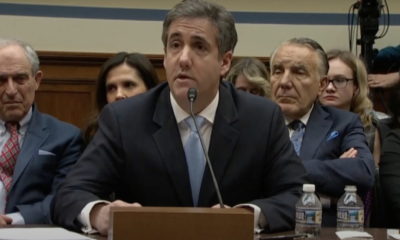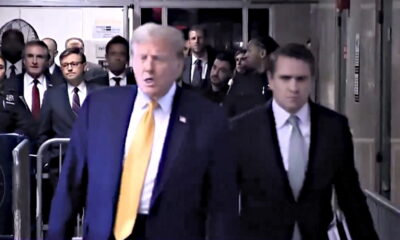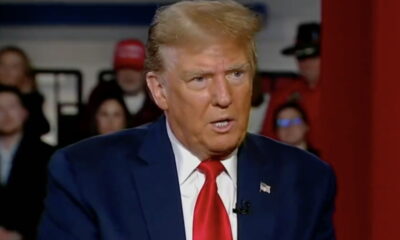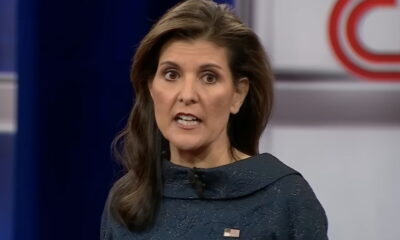‘I Need Loyalty, I Expect Loyalty’: Jim Comey’s Written Testimony Released (Full Text)
Trump Said ‘He Had Nothing to Do With Russia, Had Not Been Involved With Hookers in Russia’
Former FBI Director Jim Comey’s written testimony has just been published on the Senate Intelligence Committee’s website. In it, he says Trump told him, “I need loyalty, I expect loyalty.”
Comey appears before the Senate Intelligence Committee Thursday morning.
Trump, Comey writes, also urged him to drop the investigation into Mike Flynn and Russia: “I hope you can see your way clear to letting this go, to letting Flynn go. He is a good guy. I hope you can let this go.â€
And he says he told Attorney General Jeff Sessions “to prevent any future direct communication between the President and me.†Comey writes he did not receive a reply.
The fired, former FBI Director also writes that President Trump told him over dinner that “he had nothing to do with Russia, had not been involved with hookers in Russia, and had always assumed he was being recorded when in Russia.â€Â
This section is of special importance:
I had understood the President to be requesting that we drop any investigation of Flynn in connection with false statements about his conversations with the Russian ambassador in December. I did not understand the President to be talking about the broader investigation into Russia or possible links to his campaign. I could be wrong, but I took him to be focusing on what had just happened with Flynn’s departure and the controversy around his account of his phone calls. Regardless, it was very concerning, given the FBI’s role as an independent investigative agency.Â
The testimony ends with this:
On the morning of April 11, the President called me and asked what I had done about his request that I “get out†that he is not personally under investigation. I replied that I had passed his request to the Acting Deputy Attorney General, but I had not heard back. He replied that “the cloud†was getting in the way of his ability to do his job. He said that perhaps he would have his people reach out to the Acting Deputy Attorney General. I said that was the way his request should be handled. I said the White House Counsel should contact the leadership of DOJ to make the request, which was the traditional channel.
He said he would do that and added, “Because I have been very loyal to you, very loyal; we had that thing you know.†I did not reply or ask him what he meant by “that thing.†I said only that the way to handle it was to have the White House Counsel call the Acting Deputy Attorney General. He said that was what he would do and the call ended.
That was the last time I spoke with President Trump.Â
President Trump fired Jim Comey a month later, on May 9, 2017.
UPDATE – WATCH: Comey’s Written Testimony ‘Establishes Obstruction of Justice by Trump’ Says CNN Legal Analyst
The full text can be read on the Senate website, and below:
* * *
Statement for the Record
Senate Select Committee on Intelligence
James B. Comey June 8, 2017
Chairman Burr, Ranking Member Warner, Members of the Committee. Thank you for inviting me to appear before you today. I was asked to testify today to describe for you my interactions with President-Elect and President Trump on subjects that I understand are of interest to you. I have not included every detail from my conversations with the President, but, to the best of my recollection, I have tried to include information that may be relevant to the Committee.
January 6 Briefing
I first met then-President-Elect Trump on Friday, January 6 in a conference room at Trump Tower in New York. I was there with other Intelligence Community (IC) leaders to brief him and his new national security team on the findings of an IC assessment concerning Russian efforts to interfere in the election. At the conclusion of that briefing, I remained alone with the President- Elect to brief him on some personally sensitive aspects of the information assembled during the assessment.
The IC leadership thought it important, for a variety of reasons, to alert the incoming President to the existence of this material, even though it was salacious and unverified. Among those reasons were: (1) we knew the media was about to publicly report the material and we believed the IC should not keep knowledge of the material and its imminent release from the President-Elect; and (2) to the extent there was some effort to compromise an incoming President, we could blunt any such effort with a defensive briefing.
The Director of National Intelligence asked that I personally do this portion of the briefing because I was staying in my position and because the material implicated the FBI’s counter-intelligence responsibilities. We also agreed I would do it alone to minimize potential embarrassment to the President-Elect. Although we agreed it made sense for me to do the briefing, the FBI’s leadership and I were concerned that the briefing might create a situation where a new President came into office uncertain about whether the FBI was conducting a counter-intelligence investigation of his personal conduct.
It is important to understand that FBI counter-intelligence investigations are different than the more-commonly known criminal investigative work. The Bureau’s goal in a counter-intelligence investigation is to understand the technical and human methods that hostile foreign powers are using to influence the United States or to steal our secrets. The FBI uses that understanding to disrupt those efforts. Sometimes disruption takes the form of alerting a person who is targeted for recruitment or influence by the foreign power. Sometimes it involves hardening a computer system that is being attacked. Sometimes it involves “turning†the recruited person into a double-agent, or publicly calling out the behavior with sanctions or expulsions of embassy-based intelligence officers. On occasion, criminal prosecution is used to disrupt intelligence activities.
Because the nature of the hostile foreign nation is well known, counter- intelligence investigations tend to be centered on individuals the FBI suspects to be witting or unwitting agents of that foreign power. When the FBI develops reason to believe an American has been targeted for recruitment by a foreign power or is covertly acting as an agent of the foreign power, the FBI will “open an investigation†on that American and use legal authorities to try to learn more about the nature of any relationship with the foreign power so it can be disrupted.
In that context, prior to the January 6 meeting, I discussed with the FBI’s leadership team whether I should be prepared to assure President-Elect Trump that we were not investigating him personally. That was true; we did not have an open counter-intelligence case on him. We agreed I should do so if circumstances warranted. During our one-on-one meeting at Trump Tower, based on President- Elect Trump’s reaction to the briefing and without him directly asking the question, I offered that assurance.
I felt compelled to document my first conversation with the President-Elect in a memo. To ensure accuracy, I began to type it on a laptop in an FBI vehicle outside Trump Tower the moment I walked out of the meeting. Creating written records immediately after one-on-one conversations with Mr. Trump was my practice from that point forward. This had not been my practice in the past. I spoke alone with President Obama twice in person (and never on the phone) – once in 2015 to discuss law enforcement policy issues and a second time, briefly, for him to say goodbye in late 2016. In neither of those circumstances did I memorialize the discussions. I can recall nine one-on-one conversations with President Trump in four months – three in person and six on the phone.
January 27 Dinner
The President and I had dinner on Friday, January 27 at 6:30 pm in the Green Room at the White House. He had called me at lunchtime that day and
2
invited me to dinner that night, saying he was going to invite my whole family, but decided to have just me this time, with the whole family coming the next time. It was unclear from the conversation who else would be at the dinner, although I assumed there would be others.
It turned out to be just the two of us, seated at a small oval table in the center of the Green Room. Two Navy stewards waited on us, only entering the room to serve food and drinks.
The President began by asking me whether I wanted to stay on as FBI Director, which I found strange because he had already told me twice in earlier conversations that he hoped I would stay, and I had assured him that I intended to. He said that lots of people wanted my job and, given the abuse I had taken during the previous year, he would understand if I wanted to walk away.
My instincts told me that the one-on-one setting, and the pretense that this was our first discussion about my position, meant the dinner was, at least in part, an effort to have me ask for my job and create some sort of patronage relationship. That concerned me greatly, given the FBI’s traditionally independent status in the executive branch.
I replied that I loved my work and intended to stay and serve out my ten- year term as Director. And then, because the set-up made me uneasy, I added that I was not “reliable†in the way politicians use that word, but he could always count on me to tell him the truth. I added that I was not on anybody’s side politically and could not be counted on in the traditional political sense, a stance I said was in his best interest as the President.
A few moments later, the President said, “I need loyalty, I expect loyalty.†I didn’t move, speak, or change my facial expression in any way during the awkward silence that followed. We simply looked at each other in silence. The conversation then moved on, but he returned to the subject near the end of our dinner.
At one point, I explained why it was so important that the FBI and the Department of Justice be independent of the White House. I said it was a paradox: Throughout history, some Presidents have decided that because “problems†come from Justice, they should try to hold the Department close. But blurring those boundaries ultimately makes the problems worse by undermining public trust in the institutions and their work.
Near the end of our dinner, the President returned to the subject of my job, saying he was very glad I wanted to stay, adding that he had heard great things
3
about me from Jim Mattis, Jeff Sessions, and many others. He then said, “I need loyalty.†I replied, “You will always get honesty from me.†He paused and then said, “That’s what I want, honest loyalty.†I paused, and then said, “You will get that from me.†As I wrote in the memo I created immediately after the dinner, it is possible we understood the phrase “honest loyalty†differently, but I decided it wouldn’t be productive to push it further. The term – honest loyalty – had helped end a very awkward conversation and my explanations had made clear what he should expect.
During the dinner, the President returned to the salacious material I had briefed him about on January 6, and, as he had done previously, expressed his disgust for the allegations and strongly denied them. He said he was considering ordering me to investigate the alleged incident to prove it didn’t happen. I replied that he should give that careful thought because it might create a narrative that we were investigating him personally, which we weren’t, and because it was very difficult to prove a negative. He said he would think about it and asked me to think about it.
As was my practice for conversations with President Trump, I wrote a detailed memo about the dinner immediately afterwards and shared it with the senior leadership team of the FBI.
February 14 Oval Office Meeting
On February 14, I went to the Oval Office for a scheduled counter- terrorism briefing of the President. He sat behind the desk and a group of us sat in a semi-circle of about six chairs facing him on the other side of the desk. The Vice President, Deputy Director of the CIA, Director of the National Counter- Terrorism Center, Secretary of Homeland Security, the Attorney General, and I were in the semi-circle of chairs. I was directly facing the President, sitting between the Deputy CIA Director and the Director of NCTC. There were quite a few others in the room, sitting behind us on couches and chairs.
The President signaled the end of the briefing by thanking the group and telling them all that he wanted to speak to me alone. I stayed in my chair. As the participants started to leave the Oval Office, the Attorney General lingered by my chair, but the President thanked him and said he wanted to speak only with me. The last person to leave was Jared Kushner, who also stood by my chair and exchanged pleasantries with me. The President then excused him, saying he wanted to speak with me.
When the door by the grandfather clock closed, and we were alone, the President began by saying, “I want to talk about Mike Flynn.†Flynn had resigned
4
the previous day. The President began by saying Flynn hadn’t done anything wrong in speaking with the Russians, but he had to let him go because he had misled the Vice President. He added that he had other concerns about Flynn, which he did not then specify.
The President then made a long series of comments about the problem with leaks of classified information – a concern I shared and still share. After he had spoken for a few minutes about leaks, Reince Priebus leaned in through the door by the grandfather clock and I could see a group of people waiting behind him. The President waved at him to close the door, saying he would be done shortly. The door closed.
The President then returned to the topic of Mike Flynn, saying, “He is a good guy and has been through a lot.†He repeated that Flynn hadn’t done anything wrong on his calls with the Russians, but had misled the Vice President. He then said, “I hope you can see your way clear to letting this go, to letting Flynn go. He is a good guy. I hope you can let this go.†I replied only that “he is a good guy.†(In fact, I had a positive experience dealing with Mike Flynn when he was a colleague as Director of the Defense Intelligence Agency at the beginning of my term at FBI.) I did not say I would “let this go.â€
The President returned briefly to the problem of leaks. I then got up and left out the door by the grandfather clock, making my way through the large group of people waiting there, including Mr. Priebus and the Vice President.
I immediately prepared an unclassified memo of the conversation about Flynn and discussed the matter with FBI senior leadership. I had understood the President to be requesting that we drop any investigation of Flynn in connection with false statements about his conversations with the Russian ambassador in December. I did not understand the President to be talking about the broader investigation into Russia or possible links to his campaign. I could be wrong, but I took him to be focusing on what had just happened with Flynn’s departure and the controversy around his account of his phone calls. Regardless, it was very concerning, given the FBI’s role as an independent investigative agency.
The FBI leadership team agreed with me that it was important not to infect the investigative team with the President’s request, which we did not intend to abide. We also concluded that, given that it was a one-on-one conversation, there was nothing available to corroborate my account. We concluded it made little sense to report it to Attorney General Sessions, who we expected would likely recuse himself from involvement in Russia-related investigations. (He did so two weeks later.) The Deputy Attorney General’s role was then filled in an acting capacity by a United States Attorney, who would also not be long in the role.
5
After discussing the matter, we decided to keep it very closely held, resolving to figure out what to do with it down the road as our investigation progressed. The investigation moved ahead at full speed, with none of the investigative team members – or the Department of Justice lawyers supporting them – aware of the President’s request.
Shortly afterwards, I spoke with Attorney General Sessions in person to pass along the President’s concerns about leaks. I took the opportunity to implore the Attorney General to prevent any future direct communication between the President and me. I told the AG that what had just happened – him being asked to leave while the FBI Director, who reports to the AG, remained behind – was inappropriate and should never happen. He did not reply. For the reasons discussed above, I did not mention that the President broached the FBI’s potential investigation of General Flynn.
March 30 Phone Call
On the morning of March 30, the President called me at the FBI. He described the Russia investigation as “a cloud†that was impairing his ability to act on behalf of the country. He said he had nothing to do with Russia, had not been involved with hookers in Russia, and had always assumed he was being recorded when in Russia. He asked what we could do to “lift the cloud.†I responded that we were investigating the matter as quickly as we could, and that there would be great benefit, if we didn’t find anything, to our having done the work well. He agreed, but then re-emphasized the problems this was causing him.
Then the President asked why there had been a congressional hearing about Russia the previous week – at which I had, as the Department of Justice directed, confirmed the investigation into possible coordination between Russia and the Trump campaign. I explained the demands from the leadership of both parties in Congress for more information, and that Senator Grassley had even held up the confirmation of the Deputy Attorney General until we briefed him in detail on the investigation. I explained that we had briefed the leadership of Congress on exactly which individuals we were investigating and that we had told those Congressional leaders that we were not personally investigating President Trump. I reminded him I had previously told him that. He repeatedly told me, “We need to get that fact out.†(I did not tell the President that the FBI and the Department of Justice had been reluctant to make public statements that we did not have an open case on President Trump for a number of reasons, most importantly because it would create a duty to correct, should that change.)
The President went on to say that if there were some “satellite†associates of his who did something wrong, it would be good to find that out, but that he
6
hadn’t done anything wrong and hoped I would find a way to get it out that we weren’t investigating him.
In an abrupt shift, he turned the conversation to FBI Deputy Director Andrew McCabe, saying he hadn’t brought up “the McCabe thing†because I had said McCabe was honorable, although McAuliffe was close to the Clintons and had given him (I think he meant Deputy Director McCabe’s wife) campaign money. Although I didn’t understand why the President was bringing this up, I repeated that Mr. McCabe was an honorable person.
He finished by stressing “the cloud†that was interfering with his ability to make deals for the country and said he hoped I could find a way to get out that he wasn’t being investigated. I told him I would see what we could do, and that we would do our investigative work well and as quickly as we could.
Immediately after that conversation, I called Acting Deputy Attorney General Dana Boente (AG Sessions had by then recused himself on all Russia- related matters), to report the substance of the call from the President, and said I would await his guidance. I did not hear back from him before the President called me again two weeks later.
April 11 Phone Call
On the morning of April 11, the President called me and asked what I had done about his request that I “get out†that he is not personally under investigation. I replied that I had passed his request to the Acting Deputy Attorney General, but I had not heard back. He replied that “the cloud†was getting in the way of his ability to do his job. He said that perhaps he would have his people reach out to the Acting Deputy Attorney General. I said that was the way his request should be handled. I said the White House Counsel should contact the leadership of DOJ to make the request, which was the traditional channel.
He said he would do that and added, “Because I have been very loyal to you, very loyal; we had that thing you know.†I did not reply or ask him what he meant by “that thing.†I said only that the way to handle it was to have the White House Counsel call the Acting Deputy Attorney General. He said that was what he would do and the call ended.
That was the last time I spoke with President Trump. ###
7Â

Enjoy this piece?
… then let us make a small request. The New Civil Rights Movement depends on readers like you to meet our ongoing expenses and continue producing quality progressive journalism. Three Silicon Valley giants consume 70 percent of all online advertising dollars, so we need your help to continue doing what we do.
NCRM is independent. You won’t find mainstream media bias here. From unflinching coverage of religious extremism, to spotlighting efforts to roll back our rights, NCRM continues to speak truth to power. America needs independent voices like NCRM to be sure no one is forgotten.
Every reader contribution, whatever the amount, makes a tremendous difference. Help ensure NCRM remains independent long into the future. Support progressive journalism with a one-time contribution to NCRM, or click here to become a subscriber. Thank you. Click here to donate by check.
 |

